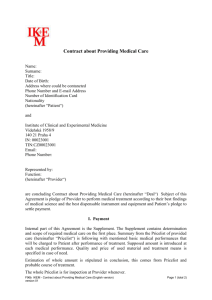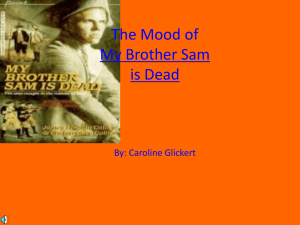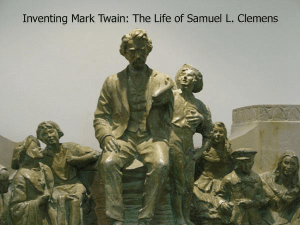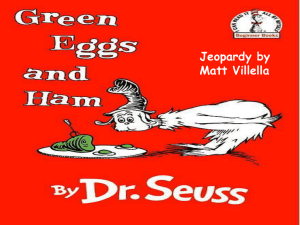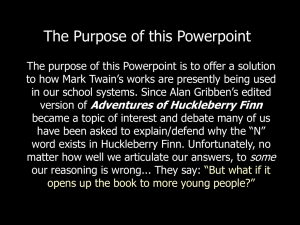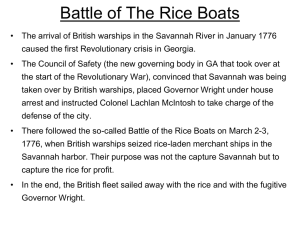Chinua Achebe Lecture 9_Presentation
advertisement
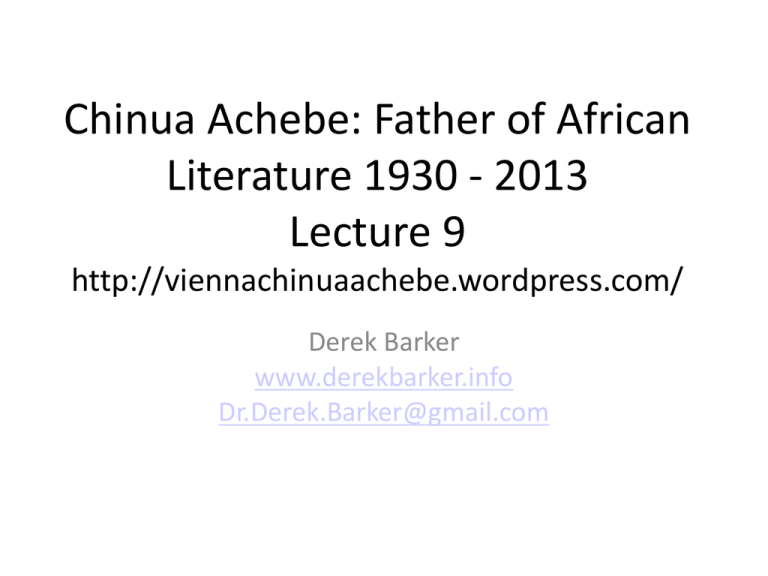
Chinua Achebe: Father of African Literature 1930 - 2013 Lecture 9 http://viennachinuaachebe.wordpress.com/ Derek Barker www.derekbarker.info Dr.Derek.Barker@gmail.com BIAFRA Conversations They tackle a number of issues. The classic "language question" is discussed, of course, and you might, by now and understandably, find this a bit boring. However, the discussion goes further than the usual one of "should African authors write in English or not?" and discussions on using vernacular, the intricacies of the Igbo language, etc. take place and I hope you'll find this enlightening. Conversations The question of the impact of modern technology on the younger generation is posed. Toni Morrison believes that literature today is more valuable than ever, but that the new generation lack the ability to imagine or visualize things that you need to have in order to read properly. Do you agree? They go on to discuss fame, the writing process • • • • • • Anthills - Themes History of suffering Power Storytelling Role of women Oral tradition Blending of old and new Anthills of the Savannah Summary I Anthills of the Savannah takes place in the imaginary West African country of Kangan, where a Sandhurst-trained officer, identified only as Sam and known as "His Excellency", has taken power following a military coup Anthills of the Savannah Summary II Achebe describes the political situation through the experiences of three friends: Chris Oriko, the government's Commissioner for Information; Beatrice Okoh, an official in the Ministry of Finance and girlfriend of Chris; Anthills of the Savannah Summary III and Ikem Osodi, a newspaper editor critical of the regime. Other characters include Elewa, Ikem's girlfriend and Major "Samsonite" Ossai, a military official known for stapling hands with a Samsonite stapler. Anthills of the Savannah Summary IV Tensions escalate through the novel, culminating in the assassination of Ikem by the regime, the toppling and death of Sam and finally the murder of Chris. The book ends with a nontraditional naming ceremony for Elewa and Ikem's month-old daughter, organized by Beatrice. • • • • Main Protagonists Beatrice Okoh Christopher Oriko Ikem Osodi Sam Beatrice Okoh Chris's fiancee, Beatrice is one of Achebe's most fully developed female characters. She works for Sam and is an old friend of Ikem's, so, through her connections to Chris, Ikem, and Sam, she plays a significant role in the action of the novel. She was born the fifth daughter to her parents (one sister has died). Her father had been hoping for a son, so she was named Nwanyibuife, which means "A Woman Is Also Something" As an adult, Beatrice is well-educated, having earned a degree with honors in English from the University of London, and she holds an important civil service position as an administrator in a state office. She also enjoys writing short fiction, which Ikem reads and admires for its "muscularity" and "masculine" qualities. Beatrice Okoh Beatrice is characterized by sophistication, intelligence, and independence, but she is also attuned to the common people on an intuitive level. Never having planned on a career in the government, she is very disturbed by accusations that she is ambitious. In reality, she desires what she has desired since childhood—to be left alone in her peaceful solitude and not attract any attention. Achebe places her firmly in the mythic tradition of the people, making her a sort of manifestation of Idemili, a goddess sent to Man to oversee morality. Beatrice Okoh Although Beatrice is unaware of the myths regarding this goddess, she grows into a woman possessed with wisdom, self-knowledge, and compassion as she connects with the culture of her land. At the end of the novel, she participates in the naming ceremony for Ikem and Elewa's baby girl by naming the infant Amaechina, a boy's name meaning "May the Path Never Close." This is bold not only because she has given a boy's name to a girl, but also because the responsibility of naming traditionally belongs to a man. Christopher Oriko In his youth, Chris attended Lord Lugard College with his friends Ikem and Sam. Even then, he served as the "buffer" and mediator between the athletic and outgoing Sam and the intelligent and pensive Ikem. As adults, the three occupy prominent roles in Kangan's new military regime, and Chris's role as Commissioner for Information again puts him in the position of go−between as Sam and Ikem engage in a contest of wills. Chris stepped down as editor of the National Gazette to accept his position on Sam's Cabinet, after which Ikem became the newspaper's editor. Christopher Oriko Chris is now Ikem's boss, but he himself reports to Sam, which puts him in the uncomfortable position of trying to get Ikem to comply with Sam's will. Although Chris sees Sam becoming mad with power, he is reluctant to give up his position in the Cabinet. Chris finally asserts himself when Sam orders him to fire Ikem, thus beginning a harrowing series of events. Fleeing for his life, Chris comes into contact with the "people" and begins to understand his country better. Chris is killed trying to save a girl from being raped at a chaotic party, and his last words are, "The last green." This is a reference to a running joke he, Ikem, and Sam shared in the early days, when they imagined themselves as three green bottles arrogantly situated on a shelf, each bound to fall. Ikem Osodi Ikem is the outspoken and reform−minded editor of the state−owned National Gazette, a position that often puts him in conflict with his boyhood friend, Sam, who is the president of Kangan. Part of his duty is to broadcast Sam's messages to the people, which are Sam's way of feeling that he is radiating power from the capitol out to the people. Ikem, on the other hand, believes strongly that the press should be free and independent of government regulation. He and Chris often debate the effectiveness of Ikem's editorials, but Ikem feels that even if they are futile, he should continue publishing them. Ikem Osodi Despite the fact that he is a London−educated intellectual, Ikem is very sensitive to the needs of the common people. His editorials are often harsh in their criticism of the new ruling regime, which makes Sam regard him as treacherous. Ikem states that the best weapon against ineffective or unjust governments is not facts, but passion. Unlike Chris, Ikem is an extremist who is not interested in working gradually toward progress and so uses his powerful position as a journalist to call for change. Speaking to a group of students, Ikem discusses the role of the storyteller in depth, insisting that it is the role of the writer to ask questions and make challenges. He concludes his speech to the students by proclaiming, "Writers don't give prescriptions. They give headaches!" Ikem Osodi Ikem also makes a joke about putting Sam's head on the country's coins, which leads to false reports that Ikem called for the beheading of the president. His fate already orchestrated, Ikem is taken in the night by government secret police and killed. Still, his presence continues to be felt among the people and his friends—a presence strengthened by the fact that he leaves behind a girlfriend close to giving birth to their child. Sam Sam is the new president of the military regime in power following a coup, a position he holds due in no small part to the efforts of his schoolmates Chris and Ikem. He is described as being very athletic and very charming, having adopted the ways of an English gentleman. Early in the novel, Ikem comments on Sam's "sense of theatre," adding that Sam "is basically an actor and half of the things we are inclined to hold against him are no more than scenes from his repertory to which he may have no sense of moral commitment whatsoever." Although he attended the prestigious Royal Military Academy at Sandhurst, Sam is fully aware that he is unprepared for his new government leadership role. Sam However, he soon becomes blinded by power, insisting on being called "Your Excellency" and seeking to be elected "President for Life." Military school trained Sam and his fellow cadets to remain aloof from political matters, and Sam was, at first, quite terrified in his new role. His solution was to gather together his friends and give some of them government positions from which he could seek their advice. Once he overcame his fear, however, he began to relish his power, becoming extremely upset at even the mildest demonstrations against him. Sam Chris can see that Sam is now a dictator−in−the-making and considers him a "baby monster," but Sam is only concerned about securing as much power for himself as he can without interacting with the people of the country. In fact, he is starving a dissident province in hopes of forcing them to comply with his authority. He soon becomes consumed with paranoia, anger, and insecurity, and when his political ambitions are disappointed, he recalls being told how dangerous boyhood friends can be. After he arranges for Ikem's murder and Chris has fled, Sam himself is killed during a coup and buried in a shallow grave. Anthills of the Savannah Quotes “Ife onye metalu' ['what a man commits'] - a statement unclear and menacing in its very inconclusiveness. What a man commits...Follows him? Comes back to take its toll? Was that all? No, that was only part of it ... The real burden of that cryptic scripture seemed to turn the matter right around. Whatever we see following a man, whatever fate comes to take its revenge on him, can only be what that man in some way or another, in a previous life if not in this, has committed. That was it! So those three words wrapped in an archaic tongue and tucked away at the tail of the bus turn out to be the opening segment of a full-blooded heathen antiphony offering a primitive and quite deadly exposition of suffering. The guilty suffers; the sufferer is guilty. As for the righteous, those whose arms are straight, they will always prosper!” Anthills of the Savannah Quotes “While we do our good works let us not forget that the real solution lies in a world in which charity will have become unnecessary.” Anthills of the Savannah Quotes “Storytellers are a threat. They threaten all champions of control, they frighten usurpers of the right-tofreedom of the human spirit — in state, in church or mosque, in party congress, in the university or wherever.” Anthills of the Savannah Quotes “It is only the story…that saves our progeny from blundering like blind beggars into the spikes of the cactus fence.The story is our escort;without it,we are blind.Does the blind man own his escort?No,neither do we the story;rather,it is the story that owns us. Anthills of the Savannah Quotes “It is the story that owns and directs us. It is the thing that makes us different from cattle; it is the mark on the face that sets one people apart from their neighbors.” Anthills of the Savannah Quotes “In the vocabulary of certain radical theorists contradictions are given the status of some deadly disease to which their opponents alone can succumb. But contradictions are the very stuff of life. If there had been a little dash of contradiction among the Gadarene swine some of them might have been saved from drowning.” Anthills of the Savannah Quotes “Charity … is the opium of the privileged; from the good citizen who habitually drops ten kobo from his loose change and from a safe height above the bowl of the leper outside the supermarket; to the group of good citizens (like youselves) who donate water so that some Lazarus in the slums can have a syringe boiled clean as a whistle for his jab and his sores dressed more hygienically than the rest of him; to the Band Aid stars that lit up so dramatically the dark Christmas skies of Ethiopia. Quotes “…she was sensitive enough and intelligent enough to understand, and her literary education could not but have sharpened her perception of the evidence before her eyes: that in the absurd raffle-draw that apportioned the destinies of post-colonial African societies two people starting off even as identical twins in the morning might quiet easily find themselves in the evening one as President shitting on the heads of the people and the other a nightman carrying the people’s shit in buckets on his head.” Questions • Does the novel represent a pessimistic dismissal of a functional African state as an impossibility? Questions • What are the significance of Anthills? • • • • • • Themes History of suffering Power Storytelling Role of women Oral tradition Blending of old and new Journalism Anthills of the Savannah is not a repudiation of journalism or of the notion of objectivity. Instead, Achebe calls for balance. Ikem writes dozens of impassioned editorials, but it is finally through his prose−poem that he connects with Chris, and through his speech that he poses a threat to the president. If Kangan is ever to be a just nation, its rulers and its people must combine old and new, objective and subjective, editorials and poetry. They must use both their heads and their hearts. The precise combination is beyond Achebe's ken to describe. As Ikem shouts to his audience, "Writers don't give prescriptions. . .They give headaches!" Hope Anthills of the Savannah describes a truly dreary historical moment, in which monstrous halfwits wield the instruments of survival and destruction, the "yam and the knife." Yet Achebe establishes hope as a given, as the only conceivable response to suffering, the only one that challenges its permanence. It's a courageous act, urging such a thing upon us— neither pessimism nor optimism but a running argument with despair. And one worth waiting thirty years for. • January 17: “Anthills of the Savanna” (1987) + Consolidation of all five novels • January 31: Exam • Enjoy your reading!
